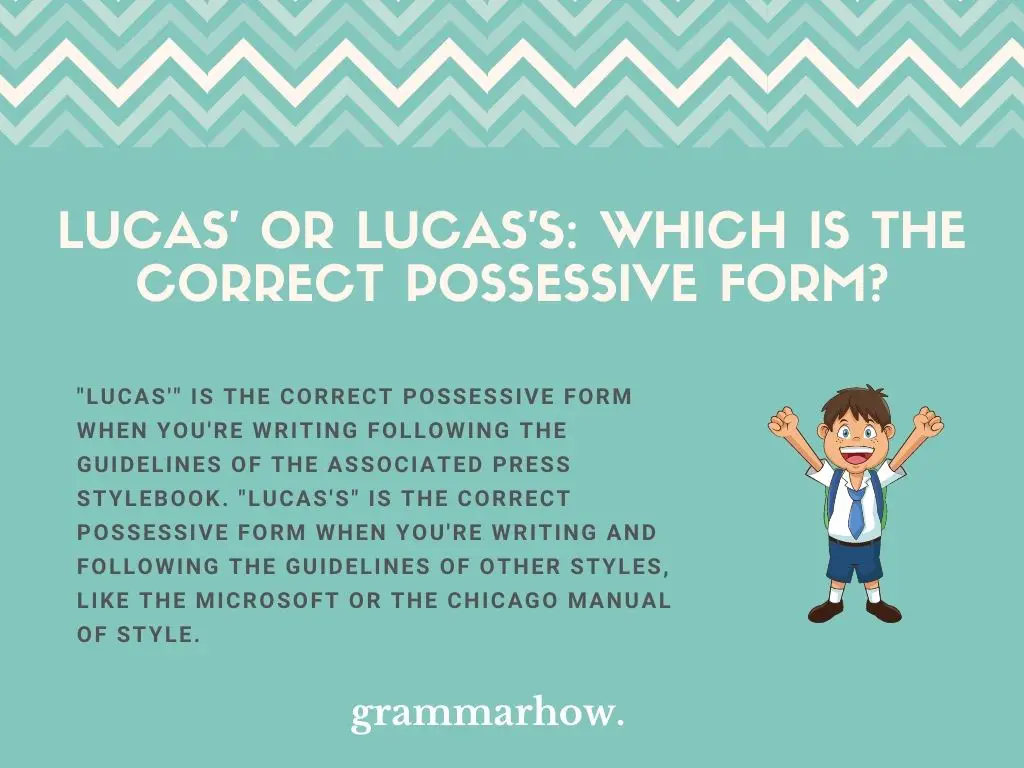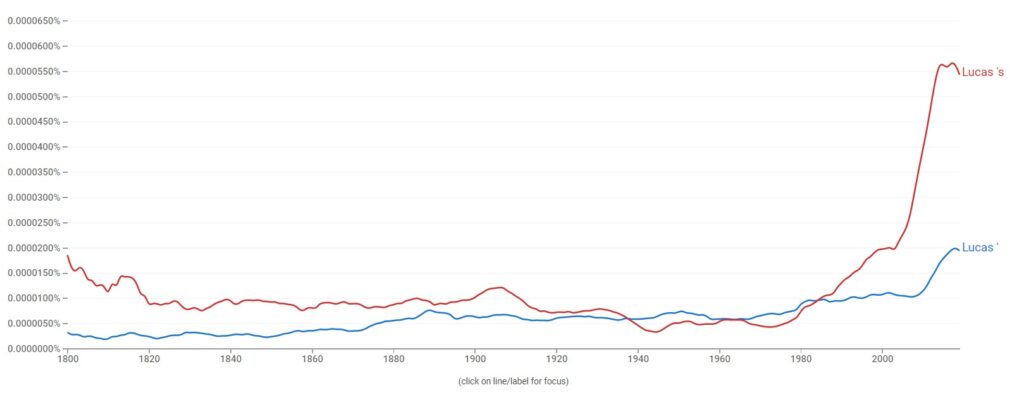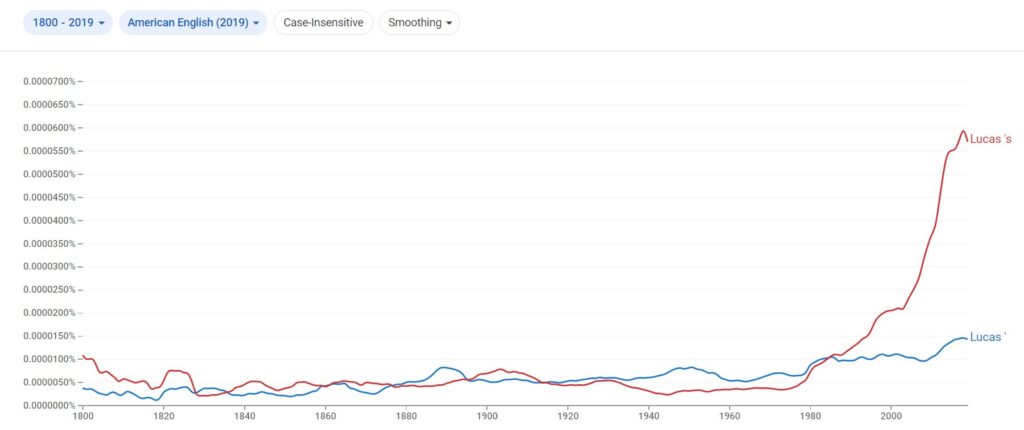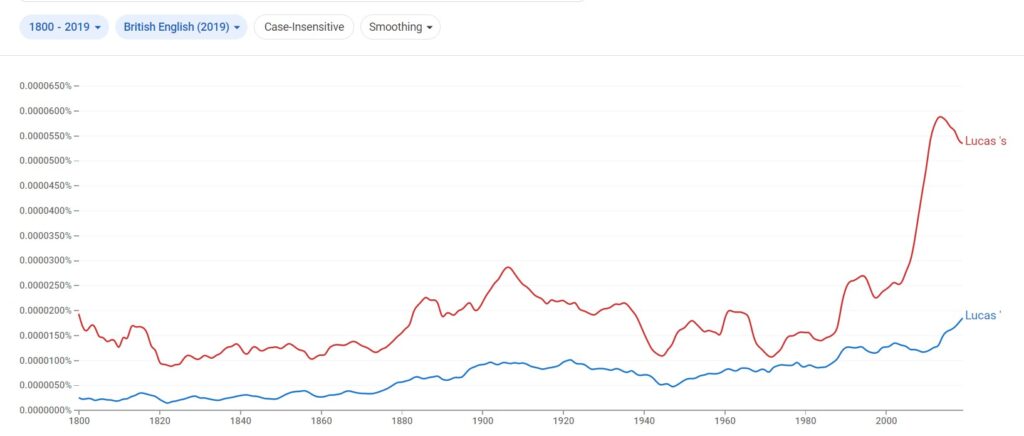Possessive forms can be complicated, especially when we’re dealing with words that end with an “S.” This article will look at the name “Lucas” and how we might use it in the possessive form.
Lucas’ Or Lucas’s: Which Is The Correct Possessive Form?
“Lucas'” is the correct possessive form when you’re writing following the guidelines of the Associated Press Stylebook. “Lucas’s” is the correct possessive form when you’re writing and following the guidelines of other styles, like the Microsoft or the Chicago Manual of Style.

Both forms are correct, and it mostly depends on your choice of style. Typically, you’ll be taught the AP Stylebook guidelines in schools, meaning that “Lucas'” is the correct possessive form.
However, there is no reason why we don’t use “Lucas’s” as another variation on the possessive form. When we write names and other such things, we’ll often want to make the difference between the name and the possessive form obvious by including the extra “S.”
We can see the differences in popularity between the two phrases in the following Google Ngram Viewer graph. Here, “Lucas'” is by far the more popular choice, with “Lucas’s” being used much less often in any case.

When To Use Lucas’
It is correct to use “Lucas'” as the possessive form when following AP Stylebook guidelines. AP style teaches us that any noun (including names) that end with an “S” only needs an apostrophe when written in the possessive form.
The extra “S” at the end of the word is unnecessary. In AP Style, “Lucas’s” would look clunky because the two “S” letters would be touching, which shouldn’t happen in most formal forms of writing.
This is the most common way that you’ll be taught about possessive forms in school. It’s likely that teachers will explain that all words that end with an “S” don’t need a second “S” after the apostrophe.
While it sometimes makes it harder to tell the word apart from its possessive form, it certainly makes it easier for people to write it down on a page.
Examples of Lucas’
“Lucas'” is the first possessive form that we’re looking at, and we can see it written in the following examples:
- That is Lucas’ bike! You can’t take it.
- I’m sorry, this is Lucas’ lunch money, not yours.
- This is Lucas’ father. What can I do for you?
- I’m not Lucas’ girlfriend anymore!
- We’re not Lucas’ friends, and we’re never going to come back to him.
- This isn’t Lucas’ favorite place to be, so you’re looking in the wrong place.
- Isn’t this Lucas’ house? Where is he?
- Why can’t we go and see Lucas’ performance later today?
- This isn’t Lucas’ address, and I don’t know where you’ve taken us!
“Lucas'” is a possessive form. We include an object after the phrase to show that “Lucas” is the person who owns whatever object we’re referring to.
When To Use Lucas’s
It is correct to use “Lucas’s” when following the Microsoft Manual of Style or the Chicago Manual of Style. In these styles, all possessive forms end with an apostrophe and an “S,” even if the original words already end with an “S.”
The double “S” at the end of the possessive form with these guidelines is a requirement. It’s better to keep it there rather than to remove it.
It’s generally more common to see possessive forms of words ending with “S” in this way. It’s likely that people tend to sway towards this usage because there’s no confusion about it being the possessive form when including the extra “S.”
If we look at the following sentences:
- Lucas’s basketball is there.
- Lucas’ basketball is there.
It’s clear that adding an apostrophe with the “S” is more readable because it’s easier to see. Sometimes, the apostrophe can be missed when reading, which makes it much more challenging to tell the two forms apart.
Examples of Lucas’s
You might write “Lucas’s” if you’re following one of the mentioned styles above, and it looks like this:
- That was Lucas’s car! How could you do that?!
- This was supposed to be Lucas’s vacation!
- Isn’t that Lucas’s house?
- I can see Lucas’s cabin on the horizon already.
- This is Lucas’s dog, and I expect you to treat him with care.
- Where is Lucas’s car again?
- We need to find Lucas’s keys before he gets back and yells at us!
- We need Lucas’s help if we’re going to find a way to get through this.
- Isn’t this supposed to be Lucas’s birthday party? Where is Lucas?
Just like before, “Lucas’s” is also a possessive form in certain styles. We use it to show that “Lucas” is in ownership of the object we’re talking about, and the apostrophe “S” combination is what helps us to demonstrate this.
Is There A Preference For Using Lucas’ or Lucas’s In US vs. UK?
While it’s clear that there are some differences based on the stylebook that you’re following, does that mean that’s where the differences end? We thought we’d look into differences between US and UK English to see if there’s anything we can learn from them.
According to Google Ngram Viewer, the popular version in US English is “Lucas’s” with an “S” after the apostrophe. This might be because it’s more common to follow the Microsoft or Chicago Manual of Style in American English.

Also, according to Google Ngram Viewer, British English follows the same style rules, and “Lucas’s” is the more popular phrase yet again. It might be simply because there are two styles that work for it, whereas there’s only one that works for “Lucas’.”

In any case, there’s a clear winner when you look at both languages and which is more popular. “Lucas’s” is the most popular spelling of the word in both US and UK English.
Final Thoughts
Both “Lucas'” and “Lucas’s” are correct when using the possessive form. The only difference comes down to the stylebook that you use. AP style suggests that Lucas’ without the “S” is appropriate, while Microsoft and Chicago style state that Lucas’s is correct.
You may also like: Chris’s or Chris’? Here’s The Correct Possessive (Helpful Examples)

Martin holds a Master’s degree in Finance and International Business. He has six years of experience in professional communication with clients, executives, and colleagues. Furthermore, he has teaching experience from Aarhus University. Martin has been featured as an expert in communication and teaching on Forbes and Shopify. Read more about Martin here.
